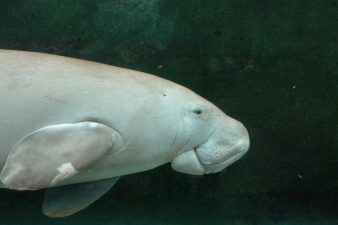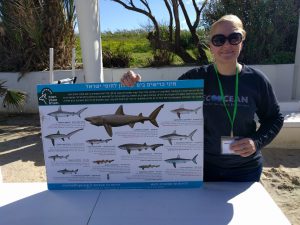 We speak to the Emirates Diving Association about why they accepted funding from the gas-guzzling car manufacturer Ford Motors
We speak to the Emirates Diving Association about why they accepted funding from the gas-guzzling car manufacturer Ford Motors
The Emirates Diving Association (EDA) based in Dubai has been working hard over the last couple of years to protect the marine environment, collect data to track changes in coral reefs in the United Arab Emirates and also to end shark finning. Clearly, the organisation cares about the environment and protecting it against the effects of climate change.
So when we found out that they were being funded by a car manufacturer known for its gas-guzzling SUV’s, we thought we’d get in touch and ask them why. I spoke to the director Ibrahim Al Zu’bi, who is also the Al Gore ambassador to the Middle East, to find out more about their policy on corporate sponsorship and why they accepted $10,000 funding from Ford Motors in 2011.
Can you tell us a little bit about the conservation movement in the United Arab Emirates? Is it a small or a strong movement?
IZ: It is getting stronger as the awareness is increasing. There are efforts to preserve the flora and fauna such as the flagship project to reintroduce the Arabian Oryx into the UAE, Oman and neighbouring countries. The growing green movement, green technologies and awareness of climate change as well as Masdar is giving the conservation movement more momentum. I’m the director of the Emirate Diving Association and we have been working on shark protection and shark tagging for the last couple of years and I can see awareness growing- we’ve seen documentary makers and marine specialist coming to the UAE to work on projects.
Do you find that the funding situation for conservation projects such as marine conservation is good or bad in the UAE?
IZ: When it comes to conservation I would say that I am a greedy man and I always want more…
I understand that you recently received some funding from Ford Motors, could you tell us a little about that?
IZ: It’s not the first time, this is the third time we received an award from the Ford project – which started almost ten years ago – to do a small study supported by the United Nations Environmental Programme looking into the outbreak of starfish on the east coast of the UAE. Whilst doing the research we realised we needed a benchmark for marine life in the Arabian Gulf and coral reefs and we didn’t find any. So we now study and monitor the coral reefs and send the information to Reef Check in California and as part of the international database… We managed to get a marine biologist to do this as part of her masters degree and now she is working on her PhD and we encourage all our divers and volunteers to be reef-check divers and collect data.
I think it’s a fantastic project because we are not only collecting data on the coral reefs from Abu Dhabi but in the whole of the UAE and we are sharing that information with the public, students, media and scientists. This also allows us to have a benchmark in the UAE so we can compare year to year. So we applied for some funds from Ford [in 2010] and we got $10,000.
Some would say that Ford is major car manufacturer which is contributing to climate change and damaging natural ecosystems by road building and car emissions- do you think it could be considered problematic to take funding from an organisation such as Ford Motors?
IZ: That’s a very good question and there are lots of environmental projects, I’m talking in general here, who are sponsored by BP and Shell and other oil companies. At EDA – we do investigate the company, we do investigate if it has an ethical background, their corporate social responsibility. We don’t do lots of PR as an NGO, the project [that Ford funded] actually costs way beyond $10,000 by the way so it was not about the money… it was a way to meet lots of NGOs [Ford offers $100,000 in environmental grants for the Middle East each year to which they receive 40-70 applications from organisations] and I give credit to Ford for that as it was a way to see other initiatives that are being done in the region. We do make it clear to all our sponsors that we are not a PR stunt.
When you do accept funding, do you think carefully about the possible motivation behind why a company would give you that money?
IZ: Of course. Each company has its own objectives- they have to make money, they have to do their marketing and PR and some companies do have genuine ethical and CSR programmes. Companies know that customers are becoming smarter and more ethical consumers and they are getting something vital from that but I think, it’s your job as an organisation, when you take money to make sure certain things are clear like what you want from the company.
I don’t want to defend Ford, I am not here to defend anybody, but the conservation work of Ford has been there for a long time and they’ve been very transparent about the money allocated. The jurors [of the panel] which decide where the money goes are all environmentalists, all of them, and I leave it to them to judge whether [Ford is] ethical or not as an organisation. At the end of the day, I need money and support. We struggle by the way, we do struggle and when companies approach us, sometimes we say ‘yes’ but most of the time we say ‘no’ because we need to reach our objectives and reach a sustainable partnership with those we work with.
It’s great to hear that you take your decisions so seriously…
IZ: Absolutely. Sometimes I wish I didn’t by the way but actually, we are proud of that and I think it gives us a good reputation in the region as transparent and we are trying to be a role model to other organisations in the region. I don’t like to say that we are fixing the whole world but we pick a specific thing and we try our best to have a transparent and sustainable approach to solving it.
Whilst doing some research on corporate sponsorship in the region, I got a sense that a lot of green organisations don’t think very carefully about some of the funding they receive. What’s your response to that?
IZ: Sometimes you feel that the green or environmental movement is being damaged and it’s sad to say that. The environmental movement started with the hippies in the sixties and they raised awareness of the environment and the need to protect it but if you think about where we are now, there is more destruction, more carbon. When we found out about the hole in the ozone layer, companies, governments and organisations like the UN said we had a problem and they got together to stop CFCs and we had some success but then it stopped. We all know that Copenhagen was a failure, at CITES (Convention on International Trade in Endangered Species summit held in 2010) we couldn’t protect the blue-fin tuna, if you read the Times or the New York Times you see that NGO’s have been lobbying and money has been invested but when it comes to green action we’ve failed.
I want to speak my mind because I do think we need to change our thinking. Enough talking! I don’t want to go to another conference! We don’t the luxury of time to just keep on talking to each other.
:: Image via Leonid Mamchenkov/Flickr.
For more on the corporate sponsorship in the Middle East see:
How Do You Stop Greenwashing? Train Better Activists, Of Course
Should Green Organisations Accept Sponsorship From Big Bad Corporations?
Maldives’s Floating ‘Green’ Golf Island Not So Green
Global Warming Message Goes Awry At UAE Water Park




Thanks Taf- It’s been a really fascinating topic to explore esp as its so complex. Money (or the lack of it) is clearly an issue and does make the decision to refuse money from not-so-green organisations harder… but I really want to thank Ibrahim al Zu’bi for his honesty and also openness in discussing this issue
Arwa X
This is a fantastic interview that addresses a very complicated problem. I have a friend in Canada who chose Graduate School over having to negotiate unethical funding for his non-profit organization. There’s just not a lot of money going around these days. I hope to be around when conservation is the number one priority. Then we’ll get some good green work done! Thanks as ever Arwa.